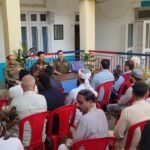Farmers in Jammu and Kashmir have started harvesting their crops earlier than usual due to rising tensions along the border after the Pahalgam terror attack.
Local farmer Asghar Husain Shah, from Gulpur Panchayat, condemned the attack and described the heightened alert in his area. “Nearby Panchayats like Karma, Kasaliya, Dawar, and Noorkote are located near the border. Following the Pahalgam incident, our area has been on high alert. We are deeply saddened by what happened and strongly condemn the attack,” Shah said.
He added, “Because of the situation, our locality has been disrupted. We are harvesting crops early because anything can happen in such times, and we want to be prepared. We need to finish the harvest quickly so that if things escalate, we don’t suffer major losses.”
Another farmer, Mushtaq, who was working with villagers to harvest corn, expressed concerns over the ongoing tensions. “What can one do if there is firing near the border? Farmers are working quickly to finish the harvest despite the mounting tension. The situation is getting worse day by day, and it’s very dire. People are afraid and have started harvesting prematurely. Workers near the Panchayat have started cutting everything—they are terrified,” Mushtaq said.
Khetrapal Sharma, the Pradhan of Shri Sanatan Sabha, condemned the Pahalgam attack and emphasized the impact of cross-border terrorism on daily life in Jammu and Kashmir. “People across the country and the world have condemned the Pahalgam attack. These border-originating terror attacks continue to disrupt life here. There’s immense anger nationwide after this attack, and the central government has taken diplomatic measures. Every citizen wants action. Even in border districts that were once peaceful, people are now uneasy, especially with the harvest season upon us,” he stated.
He added, “People are scared. They are rushing to complete the harvest as they feel they could be targeted at any moment. The tension in the area is high, and there’s widespread fear for safety. The reality is that farmers are now deciding whether to harvest crops or leave them for cattle fodder. Many prefer taking early losses rather than facing the destruction from cross-border violence.”
On April 20, Ramban district experienced landslides and flash floods after heavy rainfall, leading to significant destruction, including the blockage of the Jammu-Srinagar National Highway. Three people, including two children, were killed when houses collapsed in Bagahana village due to a landslide.
PDP Chief Mehbooba Mufti held a press conference, stressing the severity of both the natural disaster and the terror attack’s impact. She called for government compensation for farmers affected by crop damage. “In Jammu, winds have damaged basmati rice and other crops, and in Kashmir, apple and almond trees are at risk. The government should compensate farmers,” she said.
The terror attack on April 22, which targeted the Baisaran meadow near the tourist town of Pahalgam, continues to draw political condemnation. Following the attack, Jammu and Kashmir Chief Minister Omar Abdullah convened an all-party meeting to unite leaders in denouncing the act.
In the investigation, National Investigation Agency (NIA) teams, deployed at the Pahalgam site since April 23, are intensifying efforts to gather evidence. Led by senior officials, the NIA teams are questioning eyewitnesses and investigating the attack.
Additionally, the Indian Army remains on high alert, conducting search operations to neutralize the terrorists. The attack has triggered nationwide protests, with widespread calls for stricter action against Pakistan in response to the Pahalgam attack.









